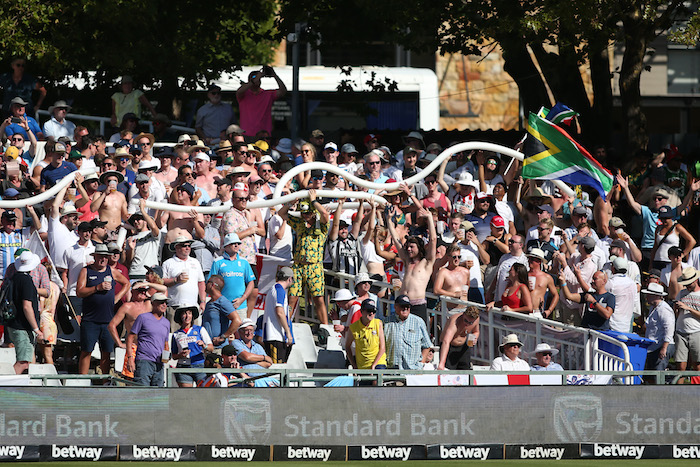One day, when the Atlantic Ocean laps the base of Lion’s Head and the Karoo desert has shrivelled all the vineyards of Paarl, what will historians and sociologists make of Test cricket, asks DANIEL GALLAN at Newlands.
It is easier to glean sense from this sport when viewing it through the prism of pre-industry, when time was measured differently and the concept of Empire still held meaning.
But today, with the swirl of social media jerking our attention between celebrity culture to the imminent collapse of civilisation, how do we justify endless days in the sun where the protagonists spend most of their time either sitting or standing still?
The second day of the second Test between South Africa and England answered this question in the dazzling Cape Town sun. Newlands a carpet of green. The north stand a buzzing blur. Table Mountain a looming presence, old enough to remember the first Test match between these countries here 130 years ago, but too big to care about Dean Elgar’s self-implosion when a century beckoned.
New magazine issue: Why De Kock must bat at four
In control on 88, Elgar misjudged a lofted drive off the otherwise ineffective off-spin of Dominic Bess. This hastened a collapse from 157-3 to 191-4 to 215-8 at stumps.
One shouldn’t be overly critical of Elgar. His trademark resolve hauled the Proteas out of a hole as the top order fumbled to 40-3. Talk of a batting paradise quickly died down in the wake of probing new-ball bowling from James Anderson and Stuart Broad.
Elgar credited Rassie van der Dussen’s spirit and the newbie seemed undaunted by the challenge, though he had some luck amid the fight. He survived an lbw review, lost his wicket off a no-ball and was dropped at slip as he mistimed his way to a battling 68 from 187 balls. It is not often Elgar is more fluent than his partner but that is exactly what he was today.
The pair kept their wicket throughout the second session and edged and bunted and cobbled 107 runs for the fourth wicket. Elgar’s ‘brain fart’, as he described it, preceded a doubler strike from Sam Curran – removing Van der Dussen and Quinton de Kock inside five overs. That left the lower order exposed to the second new ball which Anderson and Broad relentlessly landed near a widening crack on a good length.
This match, indeed the entire concept of cricket, has no meaning beyond the periphery of those who care. But within this narrow field of vision, the broad strokes of history are on show on both sides of the boundary rope.
On the field, where 22 yards of manicured clay and grass separate batter and bowler, Kagiso Rabada began the day with the wicket of Anderson to bowl England out for 269.
Rabada’s third wicket of the match was the 193rd of his career in just his 43rd match. The imposing seamer will be 25 in May and with Vernon Philander retiring from international duties after this series, Rabada will become the undisputed king of the Proteas attack.
A black child of privilege, Rabada’s narrative does not mirror the rags-to-riches story of Rugby World Cup-winning Springbok captain Siya Kolisi, who was honoured today at the tea interval. He is at once a totem of a lopsided system that benefits the wealthy and a beacon of hope that his grandparents could have never imagined.
That Rabada is the only black African representing a national sports team of South Africa at the start of 2020 is a shameful stain on all those responsible for the game. Enough data and ink has been used on the omission of Temba Bavuma from this match and another difficult day with the bat will keep continue the conversation until South Africa’s second dig at least.
Beyond the boundary, Proteas fans had to contend with a deluge of reddening skin in a cacophony of English football flags and empty beer cups. Most of the banter between Poms and Saffas was jovial apart from one tourist who wouldn’t take no for an answer when asking a security guard to be his prop in a photo.
Class and race relations play out in all sorts of ways at a cricket ground. This is a sport of empire and muscular Christianity that thrives best in countries where there is money to spare. Very few in the crowd are black or brown. Even less are found in the stuffy members pavilion that must surely double as an end-of-year function venue for the Democratic Alliance.
The ebbs and flows of another meandering day, where a lot of nothing was punctuated by brief moments of something, trickled out in the centre of this cathedral. Around the eye of the storm, lifelong fans and tag-along mates and cricket virgins and boykies up for a booze-up in the sun formed memories and opinions and hangovers.
It means nothing to those who don’t care. For those who do, Vernon Philander will resume tomorrow on 13 looking to squeeze what he can from the tail to reduce England’s 54-run advantage.
Photo: Gallo Images







